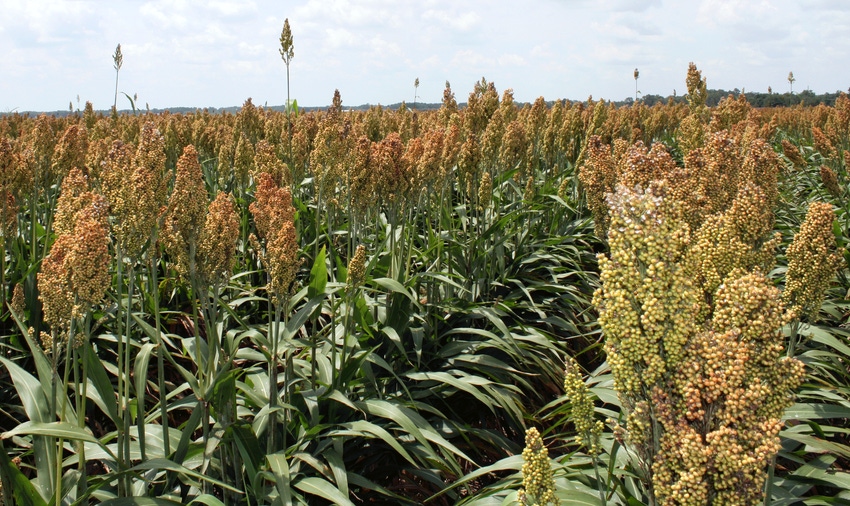
Sugarcane aphid control hinges on tolerant hybrids, treated seed
Francis Reay-Jones, associate professor of entomology at Clemson University, said using seed treatments and planting tolerant hybrids is critical because most of the labeled insecticides only provide “so so” control of sugarcane aphids.

Selecting tolerant hybrids and using treated seed are important steps to control sugarcane aphids in sorghum, which has become a major pest.
Speaking at Pee Dee Research and Education Center’s 2016 Field Day Sept. 13 in Florence, Francis Reay-Jones, associate professor of entomology at Clemson University, said using seed treatments and planting tolerant hybrids is critical because most of the labeled insecticides only provide “so so” control of sugar cane aphids.
“We have a full label for Sivanto which is a very good product; that’s the best product we have for control. We have a Section 18 emergency exemption label for Transform both for last year and this year. That label expires in April 2017 so we don’t know if we will have a full label for Transform so right now Sivanto is the only good product we have for next year,” Reay-Jones said.

Despite the sugarcane aphid, Clemson's David Gunter said he likes grain sorghum because producing dryland corn can be a challenge in South Carolina.
Despite the sugarcane aphid, Clemson's David Gunter said he likes grain sorghum because producing dryland corn can be a challenge in South Carolina.“What’s going to be key for us is to pick the right hybrid which has some level of tolerance. We don’t have a variety that can withstand populations under heavy pressure. But what these tolerant varieties can do is help to delay that first application of insecticide,” he stressed.
Reay-Jones doesn’t believe the sugarcane aphid overwinters in South Carolina and for the past couple of years the pest has shown up around mid-June. “It’s really impressive how it can build up in a field so you have to really scout at least once a week and be aggressive when putting out applications of insecticides,” he noted.
“It can certainly destroy a crop completely. The earlier the insect shows up in a season, the greater the yield loss. Sometimes the heads don’t come out at all. Sometimes the heads come out but the grains don’t fill. We’re going to keep evaluating tolerant varieties which is going to be key,” he said.
Despite the problems of sugarcane aphids, David Gunter, Clemson corn/soybean/small grain specialist at the Edisto Research and Extension Center in Blackville, said grain sorghum is a crop he likes a lot.
“The reason why I like grain sorghum is that I hate to see a lot of dryland corn planted in some of these sorry soils we have in this state. We had great dryland corn this year, but that’s only one out of five years in this state, so it’s real risky and that’s where I think sorghum fits in,” he said.
Gunter acknowledged that the sugarcane aphid is a real problem in sorghum but it should work for most farmers if they don’t heavy grass pressure on their farms. “It used to be an easy crop and a cheap crop. It’s still pretty cheap but those insecticide bills are killing us right now,” he said. “Developing tolerant hybrids is vital.”
Still, Gunter emphasized the importance of grass control in grain sorghum.
“We can start out clean and start with products like Dual and Atrazine, but about six weeks later, here comes the grass,” Gunter said. “We just don’t have a lot that goes over the top and that’s really a problem. If you call me about planting grain sorghum, I’m going to ask you about your grass pressure in that field. If you have a lot of grass, I’m going to try to talk you into a different field.”

Francis Reay-Jones, associate professor of entomology at Clemson University, says using seed treatments and planting tolerant hybrids is critical because most of the labeled insecticides only provide “so so” control of sugar cane aphids.
Francis Reay-Jones, associate professor of entomology at Clemson University, says using seed treatments and planting tolerant hybrids is critical because most of the labeled insecticides only provide “so so” control of sugar cane aphids.
David Gunter says grass control is critical in sorghum.
David Gunter says grass control is critical in sorghum.
About the Author(s)
You May Also Like





